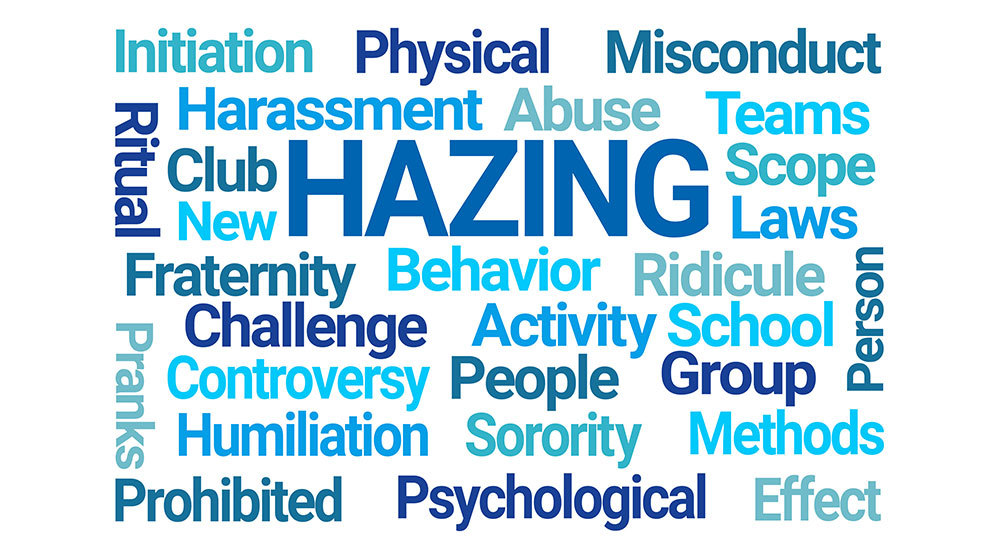A new online database of college hazing deaths shows there have been an average of five hazing deaths per year since 2000.
Hank Nuwer, a journalist, author, and investigator who has spent 50 years researching hazing deaths, partnered with the University of Washington Information School, the University of Maine, and HazingInfo.org, the nation’s first comprehensive website of hazing incidents on U.S. college campuses, to create an interactive database cataloging hazing deaths and honoring those who have lost their lives since 1838.
“The hazing deaths database is invaluable as it illuminates the horrendous consequences of hazing for so many individuals, families, and communities,” said UMaine professor Elizabeth Allan, who leads the Hazing Prevention Research Lab in the UMaine College of Education and Human Development and is the founder of the research organization StopHazing. “The secrecy and silence that often surround hazing are barriers to change. Making the tragedies more visible to the public is a necessary step toward prevention.”
RELATED: Northwestern University Settles Hazing Lawsuits, Ending Long Legal Battle
According to the data, at least 333 people have died due to hazing since 1838. More recently, there have been 122 recorded hazing deaths since 2000 — which averages to five deaths per year.
Other notable stats include:
- At least one school-related hazing death has occurred every year — except 2022 — since 1959.
- 10 deaths is the highest number of hazing deaths recorded in a single year, occurring in 2002, 2012, and 2019
- The most recent hazing death occurred in Feb. 2025 when 20-year-old Caleb Wilson was hazed by fraternity members at Southern University and A&M College in Baton Rouge
Which Colleges Have the Most Hazing Deaths?
Ten colleges with the highest number of hazing deaths recorded since 1838 are:
- 8 deaths: University of Texas at Austin
- 6 deaths: Northern Illinois University
- 5 deaths: Cornell University
- 5 deaths: Yale University
- 4 deaths: Louisiana State University
- 4 deaths: Northwestern University
- 4 deaths: Grove City College
- 4 deaths: Texas Tech University
- 4 deaths: University of Virginia
- 4 deaths: Virginia State University
Which College Fraternities Have the Most Hazing Deaths?
The 10 student organizations by highest number of hazing deaths recorded since 1838 are:
- 10 deaths: Delta Kappa Epsilon (DKE)
- 10 deaths: Lambda Chi Alpha (Lambda Chi)
- 10 deaths: Pi Kappa Alpha (PIKE)
- 9 deaths: Tau Kappa Epsilon (TKE)
- 7 deaths: Alpha Tau Omega (ATO)
- 7 deaths: Kappa Sigma (Kappa Sig)
- 7 deaths: Theta Chi
- 6 deaths: Pi Kappa Phi (Pi Kapp)
- 6 deaths: Sigma Alpha Epsilon (SAE)
- 6 deaths: Sigma Chi
RELATED: 11 New York High School Athletes Face Kidnapping Charges for Hazing
College Hazing Deaths by Decade
The database breaks down the deaths by decade, determining there was/were:
- 1 death in the 1830s
- 1 death in the 1840s
- 1 death in the 1870s
- 1 death in the 1880s
- 9 deaths in the 1890s
- 17 deaths in the 1900s
- 14 deaths in the 1910s
- 17 deaths in the 1920s
- 9 deaths in the 1930s
- 12 deaths in the 1940s
- 20 deaths in the 1950s
- 18 deaths in the 1960s
- 29 deaths in the 1970s
- 34 deaths in the 1980s
- 30 deaths in the 1990s
- 46 deaths in the 2000s
- 63 deaths in the 2010s
- 14 deaths in the 2020s
The Impact of Timothy Piazza’s Hazing Death
The above data shows a concerning increase in hazing deaths each decade between the 1990s and the 2010s, with the most deaths recorded in the 2010s. Notably, there has been a significant drop in deaths so far this decade. While many factors are likely at play for the decrease, arguably the most influential was the death of 19-year-old Timothy Piazza, who tragically died in Feb. 2017 as a direct result of a hazing ritual at a Penn State fraternity.
Since Timothy’s death, his parents, Evelyn and Jim Piazza, have tirelessly fought to reform the way fraternities and colleges handle hazing and alcohol abuse. As a result, multiple states have established laws that stiffen penalties for hazing.
In 2018, Pennsylvania Governor Tom Wolf signed the Timothy J. Piazza Anti-Hazing Law, commonly referred to as “Tim’s Law.” The law provides immunity to individuals needing medical assistance as a result of hazing or those who seek help for them, strengthens penalties for organizations that haze and introduces four new criminal offenses, including hazing, aggravated hazing, organizational hazing, and institutional hazing. It also requires all organizations that consist primarily of students to publish anti-hazing policies and publicly report hazing violations.
RELATED: 7 Hazing Tragedies That Spurred Harsher Anti-Hazing Laws in 9 States
In 2021, Governor Phil Murphy signed Timothy J. Piazza Law which stiffens the penalties for hazing in New Jersey, Piazza’s home state. Under the law, public and non-public middle schools and high schools as well as higher education institutions must adopt anti-hazing policies and penalties for violations of the policies. The law also upgraded hazing from a fourth-degree crime to a third-degree crime if it results in death or serious injury.
Penn State also established the Timothy J. Piazza Center for Fraternity and Sorority Research and Reform which focuses on campus prevention strategies to combat hazing, hazardous drinking, and other dangerous behaviors.
Piazza’s death also resulted in one of the largest hazing indictments in U.S. history. The fraternity and 18 of its members were indicted on involuntary manslaughter charges and Beta Theta Pi was permanently banned from Penn State. Although court rulings led to the dismissal of many of the major charges, four served prison terms for their roles.
Stop Campus Hazing Act Signed Into Law
Most recently, in Dec. 2024, then-President Joe Biden signed into the law the Stop Campus Hazing Act (SCHA), the first-ever federal anti-hazing legislation that amends the Jeanne Clery Act to require institutions of higher education to disclose hazing crime statistics in its Annual Security Report (ASR), publicly list student organizations found responsible for hazing, and offer a research-informed hazing prevention program for students.
RELATED: What the Stop Campus Hazing Act Means for Universities and Legal Liability
According to the Clery Center, the Stop Campus Hazing Act has three primary components:
- Inclusion of hazing statistics in annual security reports,
- Implementation of hazing policies, including those specific to hazing prevention, and
- Compilation of a campus hazing transparency report.
The timeline for implementation is as follows:
- June 23, 2025: Hazing policies must be in place.
- July 1, 2025: Institutions must have a process for documenting violations of the institution’s standards of conduct relating to hazing.
- December 23, 2025: The Campus Hazing Transparency Report, which includes the violations that institutions begin documenting in July, must be publicly available. The Campus Hazing Transparency Report must be updated at least two times a year.
- October 1, 2026: Hazing statistics will first be included in the 2026 annual security report (2025 statistics)
Data from the National Study on Student Hazing shows nearly 55% of college students involved in clubs, teams, and organizations report experiencing hazing.
Stop Campus Hazing Act Webinar
Want to learn more about SCHA’s requirements and its anticipated impact on colleges and universities? Join Interim Clery Center Executive Director Abby Boyer on June 24 for a free encore presentation of Campus Safety’s recent webinar on this important legislation, its requirements, and practical compliance strategies.
In the webinar, Boyer will provide updated insights on key implementation trends to help institutions of higher education meet their obligations under the law.
The webinar will also include:
- Legislation Overview: A recap of the Stop Campus Hazing Act and what it requires.
- Promising Practices: Actionable steps for compliance and how to implement policies effectively.
- Key Stakeholders: Learn who at your institution should be involved in the compliance process.
- Latest Trends: Insights into how campuses are aligning with this landmark legislation.
- Interactive Q&A: Extended time to get your pressing questions answered by an expert.







